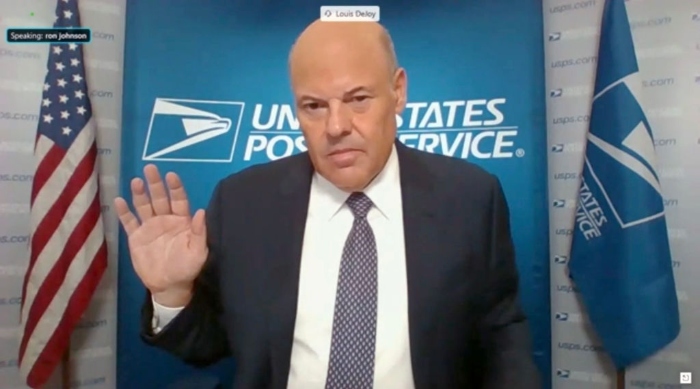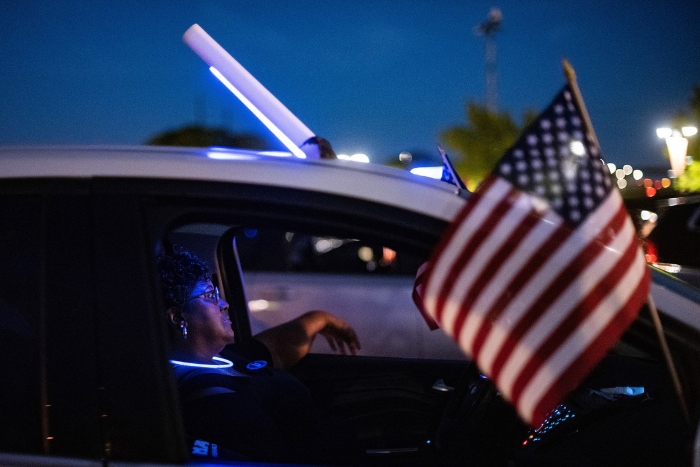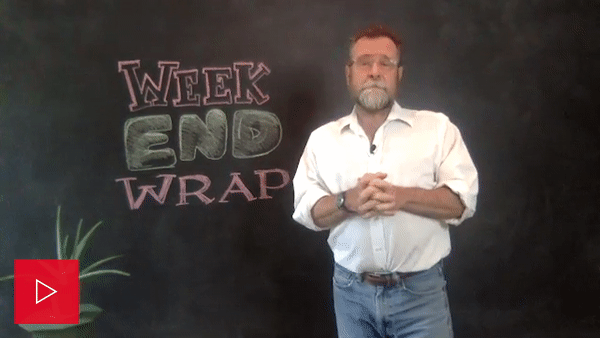| | |  | BY RENUKA RAYASAM | Presented by Facebook | With help from Myah Ward WHILE YOU WERE WATCHING — Five months and one week after President Donald Trump declared Covid a national emergency , the virus remains out of control in all but a handful of states in the Northeast, according to Covid Exit Strategy. Since Monday, the first day of the Democratic convention that nominated Joe Biden for president, about 4,000 people have died of Covid in the United States. The country is averaging about 50,000 new infections and more than 1,000 deaths per day in August, according to Johns Hopkins University. “We are on fire,” said Nina Fefferman, a disease modeler and professor of ecology and evolutionary biology at the University of Tennessee. Coronavirus is a global problem, but many countries — South Korea, Germany, New Zealand, Italy — have been able to drastically slash their infection rates and resume a semblance of normal life. Yet in the United States, numerous outbreaks at colleges and universities around the country, including a Georgia high school and the University of North Carolina, have forced school closures and another semester of online learning. Today a six-year-old girl died in Florida. The death toll will hit 252,000 by Election Day, according to the University of Washington’s Institute for Health Metrics and Evaluation. Cases have been slowly coming down after a July peak, but school and college reopenings and the return of normal activities like attending parties or going to restaurants is threatening that incremental progress, said Jeffrey Shaman, an professor of environmental health sciences at Columbia University. New daily infections should be around 500 a day for the whole country — a hundredth of current levels — in order to make going out to eat safe again and to pave the way for school and college reopenings, Shaman said. At that level, contact tracers could track new outbreaks and labs would have the capacity to quickly turn around test results. Mask mandates have caught on in many parts of the country. Texas and other states have shut down bars. But researchers like Shaman and Fefferman say that far more drastic measures, such as another short-term shelter in place order along with social support for vulnerable groups, a national mask mandate and federal coordination of lab capacity, will be needed to contain the virus in the U.S. “Given what we know, we should not have gotten to this point,” Fefferman said. “All epidemiologists feel this way — just screaming into the void.” Welcome to POLITICO Nightly: Coronavirus Special Edition. The rise of the desi alpha female. Reach out rrayasam@politico.com or on Twitter at @renurayasam.
| |
| | A message from Facebook: Facebook launches new Voting Information Center. Facebook is building the largest voter information effort in US history, starting with the new Voting Information Center, where you can find the latest resources about voting in the 2020 election. Our goal is to help register 4 million voters. Explore our new Voting Information Center now. | | | | | GEEK SQUAD — The Democratic Party is kicking off the most complicated get-out-the-vote campaign in history — all without knocking on a door, Zach Montellaro and Elena Schneider write. Record high numbers of people plan to vote by mail due to the coronavirus pandemic, and that group skews heavily Democratic, according to polling and absentee ballot request data. But voting by mail is also more complicated than voting in person, and the party's campaign machinery has rapidly transformed itself into a system for helping voters navigate those obstacles. There’s the matter of getting an absentee ballot to begin with, which voters must apply to do in most states. Esoteric factors from signature requirements to delivery times and even rules about how the ballot envelopes are sealed all result in more mail votes getting tossed each election compared to in-person votes. And unusual delays in mail delivery this summer have heaped more stress on the situation. The Democratic convention was one of the first major public steps in a campaign that over a dozen Democratic operatives described in interviews, which will run the party tens of millions of dollars and become the main focus of the coronavirus campaign. Coronavirus has turned the Democratic Party’s voter contact program, one operative said, into something more like a tech support operation than a traditional door-knocking effort.
| |
| | PLUG IN WITH PLAYBOOK AT THE RNC : Join POLITICO Playbook co-authors Anna Palmer and Jake Sherman for "Plug In with Playbook," our new political show popping up at the Republican National Convention each morning at 9 a.m. EDT. Cut through the noise and go behind the scenes with elected officials, political VIPs and top journalists for the latest campaign news and whispers, in-depth analysis of down-ballot races, and the latest juicy nuggets from reporters' notebooks. Aug. 25-27. Watch it live here. | | | | | | 
Postal Service Postmaster General Louis DeJoy is sworn in for a virtual Homeland Security and Governmental Affairs Committee hearing on U.S. Postal Service operations during Covid-19. | Getty Images | | | ‘SIMPLY NO END IN SIGHT’ — Postmaster General Louis DeJoy defended his proposed changes to the Postal Service today during an onslaught of scrutiny from congressional Democrats, warning that the U.S. Postal Service faces a dire financial situation and is an operational mess, Andrew Desiderio, Marianne LeVine and Daniel Lippman write. In lengthy prepared remarks before the GOP-led Senate Homeland Security and Governmental Affairs Committee, DeJoy acknowledged several concerns lawmakers have raised in recent weeks, including the significant delivery delays due to the Covid-19 pandemic. DeJoy, who attributed those delays in part to his reforms, asked Congress for financial relief and called on lawmakers to urgently address the Postal Service’s fiscal challenges, including its pension system. “Without dramatic change, there is simply no end in sight, and we face an impending liquidity crisis that threatens our ability to deliver on our mission to the American public,” DeJoy told senators via video conference. DeJoy, a Republican megadonor, pushed back on the idea that his proposed changes to the organization are intended to suppress mail-in voting for the upcoming election, calling it a “false and unfair” narrative and an “outrageous claim” that undermines public faith in the election. He vowed to prioritize election-related mail and said Americans should have confidence that their ballots will be delivered on time. The video that dominated your feed today: Sen. Tom Carper (D-Del.) demonstrated the difficulties of video chatting today when he dropped the F-bomb during the nationally televised virtual Senate hearing, seemingly unaware that his camera and microphone were on.
| |
| |  
| | | | | HOME ALONE — When the DNC finally unfolded, what happened in Milwaukee? Not everyone stayed home. There was still a small staging area inside the arena and some protesters outside. Mostly, though, the city was quiet as Milwaukeans watched what could have been. Photographer Steven Voss captured the atmosphere this week — the empty shops and streets, the disappointed delegates watching at home, the drive-in viewings for some party supporters to take in the televised spectacle — of a city bereft of its big event.
| 
People watch the final night of the Democratic National Convention being projected onto an outdoor screen at the Milwaukee Zoo on August 20. | Steven Voss | | | Nightly asked you: How have your convention viewing plans shifted with the changes in format and location? Do you plan on watching more or less? Do you have any traditions that you've had to alter or cancel? Below are some of your lightly edited responses. “I am a reliable Democratic voter and a political junkie. I will not be watching the convention for the same reasons I cut the cord. I'd rather read a few summaries and stream the speeches I am interested in. It's still the same Talking Heads Media Event to most Americans, even if it looks a little different. We already know the nominee and the party policies, so there's no reason to watch live.” — Elizabeth Wolfe, geologist, Flagstaff, Ariz. “I never watched past presidential conventions. The chaos was off-putting. The remote format is fresh! No doubt, it's exhilarating for delegates attending the live, crowded, noisy conventions. This year's format, however, may offer more to viewers.” — Susan Maunu, paralegal, Altadena, Calif. “My household usually watches the convention and checks on the Yankees during commercials. This year, we will watch Yankees baseball, DVR the convention and hope there are highlights to watch after the game. I will miss the balloons and hoopla, but any excuse to watch more baseball works for me!” — Dianne Saccone, retired, East Meadow, N.Y. “I am a Biden supporter, but as usual, I will be watching both Democratic and Republican conventions. I really like the Democratic version. I love the virtual format, hope we see more in the future.” — Betty Ann Modaff, retired, Asheville, N.C. “Skipping it all. Why sit in front of it for hours, then have it repeated dozens of times the following day? Overkill big time!” — Jim Cox, retired, Louisville, Ky. “I think I plan to watch more. In the past, while party business was being conducted, I would likely watch correspondents around the floor interviewing various party leaders. In the cyberspace version, the convention seems tighter and more closely scripted and makes me not want to miss anything.” — Heddie Tinker, mental health counselor, New York City “For over 50 years, beginning with my grandparents, I have watched every convention, even being allowed to stay up late for those days. The DNC was considered a major event in our family. As an adult, I continued this as well with my children. This year, I have decided to catch the highlights and watch the reruns the following morning. I still engage, just differently.” — Lisa Ravelo, teacher, Sidney, Maine
| |
| | INTRODUCING POLITICO MINUTES: An unprecedented campaign season demands an unconventional approach to news coverage. POLITICO Minutes is a new, interactive content experience that reveals the top takeaways you need to know in an easy-to-digest, swipeable format delivered straight to your inbox. Get a breakdown of what's been learned so far, why it matters, and what to watch for going forward. Sign up for POLITICO Minutes, launching at the 2020 Conventions. | | | | | | | NO MORE CLASSES, NO MORE BOOKS — It wasn’t the week that colleges — or the Trump administration — had hoped for: Just days after reopening their doors to students, several schools saw significant spikes in coronavirus cases and some cancelled in-person classes. In the latest POLITICO Dispatch, education reporter Bianca Quilantan breaks down what went wrong — and where schools can go from here.
| | | | THE WEEK THAT WAS — In the Weekend Wrap edition of Punchlines, Matt Wuerker takes us through the best in cartoons and satire of the past week, including the virtual DNC, the 100th anniversary of women’s suffrage and the continued concern over postal delays and the election.
| 
| | | | |
$27.2 million The amount of money ActBlue, the online donation platform used by most Democratic campaigns, processed Thursday as Biden delivered his DNC acceptance speech. The haul was the platform’s fourth-biggest fundraising day of a record-setting year, according to a POLITICO analysis. In all, donors gave more than $82.6 million through ActBlue during the four days of the convention. (h/t Elena Schneider) |
| | | ‘I’VE LOST HAIR OFF MY HEAD’ — It’s a lost summer for New York’s Coney Island, where amusement operators are buckling under state orders requiring them to stay closed even as many indoor attractions are allowed to open their doors, Erin Durkin writes. The Wonder Wheel, the Cyclone and other rides at the seaside amusement mecca have been idled all summer by the coronavirus pandemic, and now seem likely to remain that way for the rest of the season as fall approaches. Gov. Andrew Cuomo gave the go-ahead last Friday for indoor museums to open on Aug. 24 at reduced capacity. Bowling alleys were allowed to open this week, and gyms will get back into action in the next couple of weeks. The governor has suggested that movie theaters will be next to get the green light. But amusement rides, like the ones that powered Coney Island’s rise as the city’s storied “people’s playground,” are among the few industries still required to be shut down. “It’s millions of dollars in revenues that have been lost. A hundred folks that work for us could not work,” said Dennis Vourderis, whose family owns Deno’s Wonder Wheel Park. “I’ve lost hair off my head, nights of sleep .... The whole family is just emotionally drained from this.”
| |
| | A message from Facebook: How Facebook is preparing for the US 2020 election
— Launched new Voting Information Center
— More than tripled our safety and security teams to 35,000 people
— Implemented 5-step political ad verification
— Providing greater political ad transparency
Learn about these efforts and more. | | | Did someone forward this email to you? Sign up here. | |
|
| | Follow us on Twitter | | | FOLLOW US | | |
| |

No comments:
Post a Comment
Note: Only a member of this blog may post a comment.